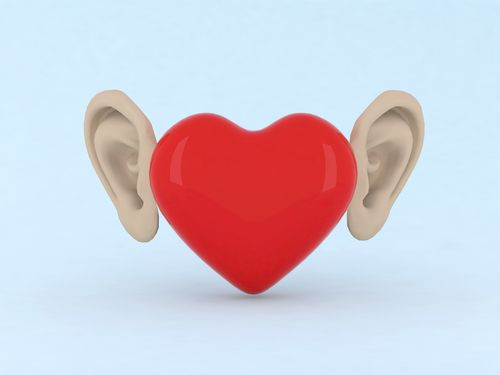Heart Healthy Tip: Tickling Ears With Nerve Impulses Can Help Stabilize An Overworking Heart

Each year over 600,000 people die of heart disease in the United States, and there is a never-ending quest for new interventions that can stop this killer disease. Now researchers have discovered a rather simple technique for improving heart health: tickling the ears. This new study from the University of Leeds has discovered that stimulating nerves in the ear could improve heart health. The study is published in Brain Stimulation.
The stimulation was carried out by applying electrical impulses to the tragus, the small pointed and raised flap situated at the front of the external opening of the ear. It is placed in front of the ear canal. The researchers discovered that electrical stimulation of the tragus altered the effect of the nervous system on the heart by reducing the nervous signals that pump already fragile hearts to work hard. The electrical impulses were applied using a standard TENS (transcutaneous electrical nerve stimulation) machine, which is generally used as an alternative to painkilling medication, as it sends electrical impulses that help to ease certain types of pain, like labor, joint, or period pains, and headaches.
The researchers assessed the efficacy of these machines in improving heart health by applying their electrical impulses on 34 healthy people. The electrodes were applied to the ears of these people for 15-minute sessions. When the TENS machine sends out tiny shocks to the ear, it produces a tickling sensation, according to Professor Jim Deuchars, professor of systems neuroscience in the University of Leeds' faculty of biological sciences.
When the TENS machine was on, the researchers monitored the variability of subjects' heartbeats and the activity of the part of the nervous system that drives the heart. They continued to monitor 15 minutes after the TENS machine was switched off.
"The first positive effect we observed was increased variability in subjects' heartbeats.
A healthy heart does not beat like a metronome. It is continually interacting with its environment — getting a little bit faster or a bit slower depending on the demands on it,” said lead researcher Dr. Jennifer Clancy, of the University of Leeds' School of Biomedical Sciences, in a statement.
“An unhealthy heart is more like a machine constantly banging out the same beat. We found that when you stimulate this nerve you get about a 20 percent increase in heart rate variability."
The second positive effect was in suppressing the sympathetic nervous system (SNS). SNS gets triggered in response to a threat to survival — conditions like stress, depression, aging, or certain medical problems. SNS increases the heart rate by releasing the hormone adrenalin and is often the reason for chronic heart failure.
"We measured the nerve activity directly and found that it reduced by about 50 percent when we stimulated the ear," Clancy said. "This is important because if you have heart disease or heart failure, you tend to have increased sympathetic activity. This drives your heart to work hard, constricts your arteries and causes damage."
She added that many heart failure treatments aim to stop that sympathetic activity, such as beta-blockers, which block the action of the hormones that implement these signals. Using the TENS machine, she said, the researchers obeserved a reduction in the nervous activity. The results were promising even 15 minutes after the TENS machine had been switched off with neither the heart rate variability nor sympathetic nerve activity returning to the baseline.
But how exactly do these electric impulses regulate the heart beat? They do this by stimulating a major nerve called vagus that is part of the cranial nerves and conveys sensory information about the body’s organs to the nervous system. A sensory branch of the vagus is present in the outer ear. With the TENS machine, the researchers were able to send impulses through the nerves into the brain and thus influence the brain’s outflows to regulate the heart.
Vagal nerve stimulation has also shown to be effective in treating conditions such as epilepsy.
Deuchars acknowledges that the research is still in the nascent stage, “but we think it does have potential to improve the health of the heart and might even become part of the treatment for heart failure."
"We now need to understand how big and how lasting the residual effect on the heart is and whether this can help patients with heart problems, probably alongside their usual treatments. The next stage will be to conduct a pre-clinical study in heart failure patients,” he said.
Source: Clancy JA, Deuchars J, Mary DA, Witte KK, Greenwood JP, Deuchars SA. Non-invasive vagus nerve stimulation in healthy humans reduces sympathetic nerve activity. Brain Stimulation. 2014.



























